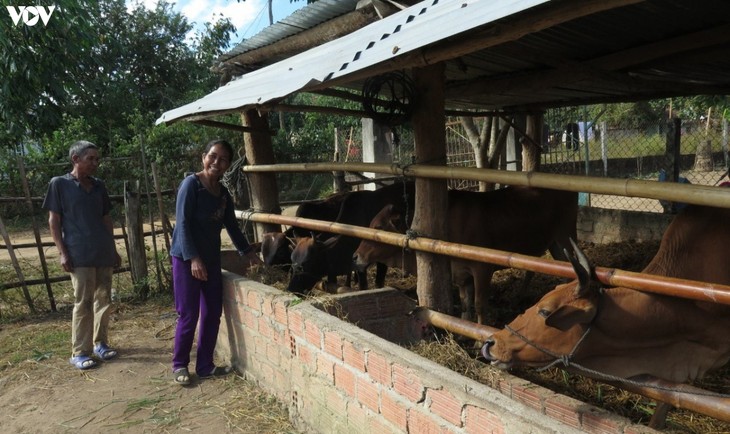(VOVWORLD) - Duc Co border district in the Central Highlands province of Gia Lai has a high poverty rate, especially among ethnic minorities. Authorities are paying special attention to an action program to rapidly reduce the number of poor ethnic minority households in Duc Co.
 Many ethnic households have been loaned to raise cattle. Many ethnic households have been loaned to raise cattle.
|
At the end of last year, Duc Co district had more than 2,900 poor households, 2,600 of them ethnic minority households.
The district’s goal is to reduce the poverty rate 2% a year until 2025, and 3% a year in ethnic minority areas. To achieve this goal, many solutions have been outlined, from creating jobs to changing people’s way of thinking.
Ro Lan Iek of Krel village in Ia Krel commune, whose husband died young, was forced to raise 3 school-age children alone. With an unstable job, Iek’s life was precarious.
In 2019, Iek was hired to work for a local rubber company. Then she borrowed 2,200 USD from the district’s Bank for Social Policies to plant a coffee garden. Now Iek has a more stable income and was even able to buy some cows.
“In 2020, the company loaned us 3,000 USD to build a house. Now that I have a good house, I’m working even harder for the company, plus raising cows and growing coffee. Now I can cover our everyday needs and afford the children’s school fees. Last year we were removed from the poor household list,” she said.
To help local households get out of poverty, courses on farming techniques have been organized and farm restructuring models have been implemented.
 Poor people in Duc Co district have been hired to work for local rubber companies. Poor people in Duc Co district have been hired to work for local rubber companies.
|
Duc Co district’s Bank for Social Policies has introduced on-site sessions with the villagers to help them obtain preferential capital.
The local administration and community leaders have mobilized villagers to take a more active role in helping themselves escape poverty.
“The most difficult problem now is that there is less and less farm land and more and more people. So we’ve encouraged young people to get an education and get out of poverty. If they can graduate from high school, they can work for a company. They must have a diploma to find a job,” said Ro Mah Quach, Deputy Secretary of the Party cell and chief of Krel village.
Ia Krel commune has 2,100 households in 10 hamlets. 35% of the population belong to an ethnic minority. The local poverty rate is 13.4%.
Nguyen Thi Thuy Loan, Chairman of the Ia Kel People's Committee, said that this year the commune hopes to reduce poor households 2.2%. That’s 47 households.
“We’ve increased communications to change people's way of thinking and encourage them to apply technology to animal husbandry and production. Poor people and those without production land will be given jobs with a company. The local authorities are making it easier, especially for people in the 47 poorest households, to obtain jobs,” said Loan.
By the multidimensional poverty criteria, more than 12% of the households in Gia Lai province are poor, and 88% of the poor households belong to ethnic minorities.
Gia Lai’s goal is to reduce the number of poor households 2%, and the number of poor ethnic minority households 3%.
Pham Tran Anh, Deputy Director of the provincial Department of Labor, Invalids and Social Affairs, said that the Department will help localities, including Duc Co district, reach their poverty reduction target for this year.
According to Tran Anh, “The Department will advise the authorities at all levels to develop specific solutions to help poor households escape poverty. We’ll fully tap the resources provided by the central government, and coordinate with mass organizations to mobilize contributions from businesses and the community.”
Duc Co district has promulgated a resolution on linking production and sales to create a stable outlet for key agricultural products in the locality, particularly in ethnic minority areas.